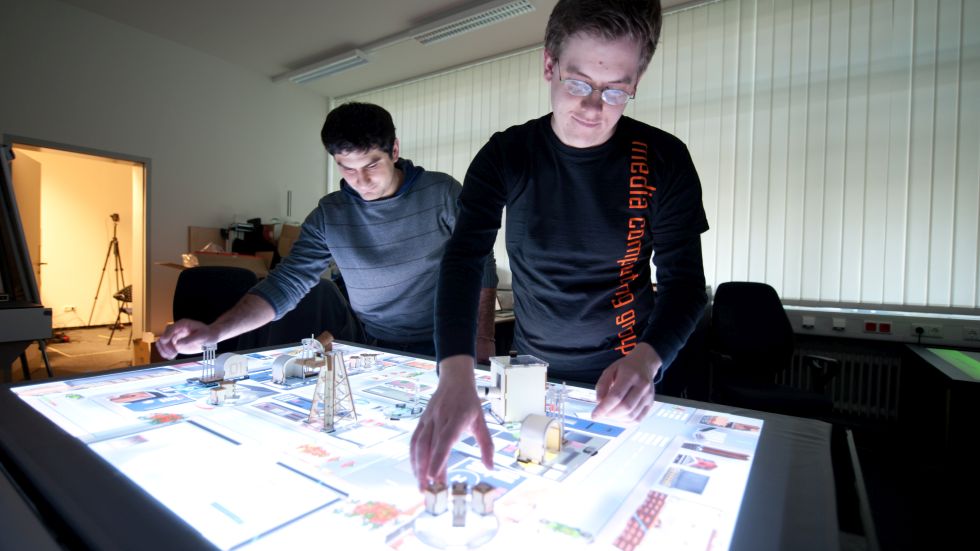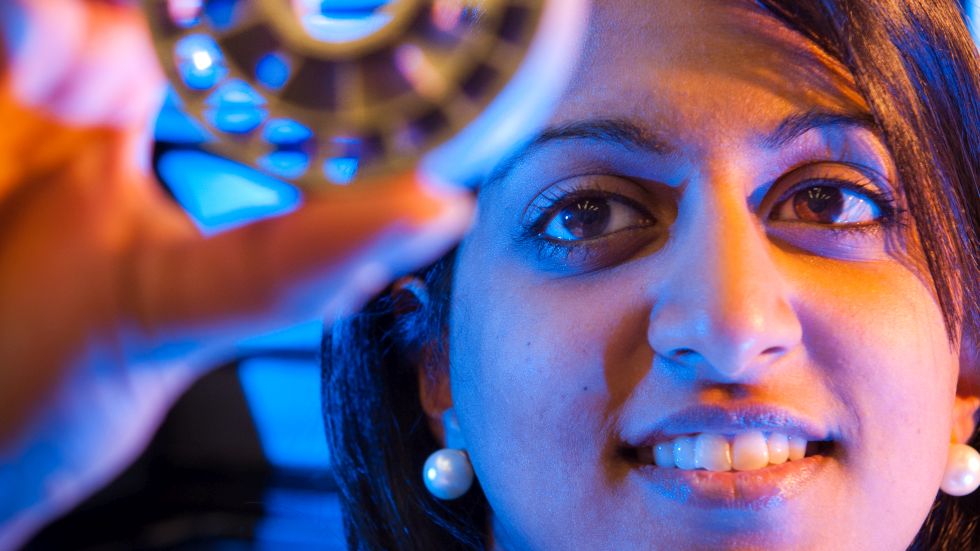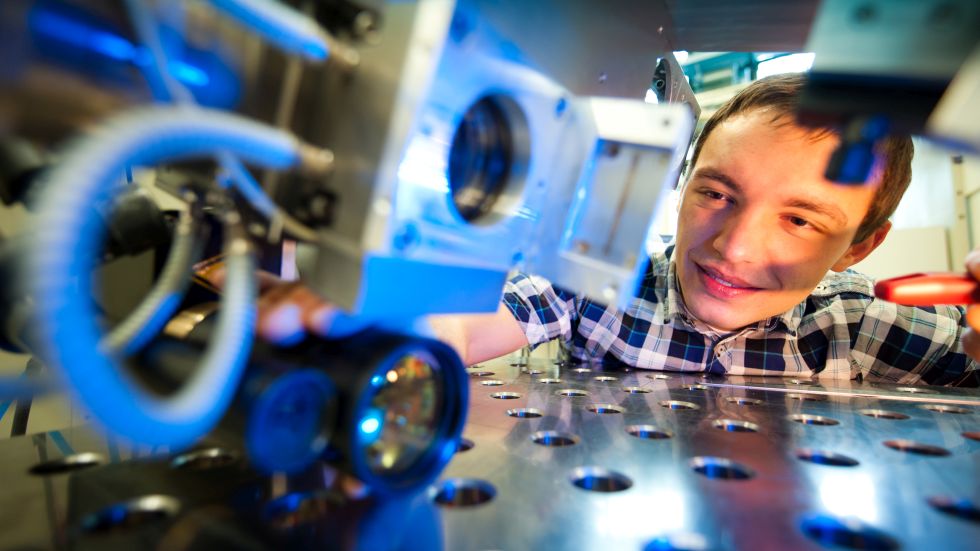Support making RiG more international!
Click here to start the surveySupport making "Research in Germany" more international! Your expertise and commitment are the key to the further development of promoting the German research landscape. We invite you to take part in our online survey and share your valuable experiences and opinions. Duration: 7-10 min.
Please start the survey at the end of your visit.
Postdoc positions in Germany
If you decide to continue working in science or research after completing your doctorate, you can do so at a university, a non-university research institute or a company in Germany that engages in research and development (R&D). They all offer attractive positions for international postdoctoral researchers.

Postdoc at a university in Germany
Universities are the most popular employers for postdocs in Germany. People who want to continue working in research often decide in favour of a job at a university.
The postdoctoral phase at a university (or even a non-university research institute) usually serves the purpose of further academic qualification. During this period, junior researchers hope to meet the requirements for a professorship or a position in (academic) top management. That is why positions for research associates are usually temporary.
Type of employment
As a rule, postdocs work as research associates at a professorial chair or as members of research staff in a research group or a third-party-funded project.
Generally, research associates at a German university not only work as researchers and teachers, but also perform administrative duties. They conduct seminars and practical exercises, carry out tasks relating to undergraduate examinations and are involved in the self-government of the university. In addition, they usually work on their own research/habilitation project.
Postdoctoral researchers can also work in research groups or third party-funded research projects. Third-party funding is normal practice at German universities. Roughly 30 per cent of all academic positions are funded in this way. Naturally, the main emphasis here lies firmly on research. The relevant (research) duties – and as a rule also the duration of the contract – are usually tied to a concrete project. It is nonetheless possible that teaching duties are also involved.
If you are not appointed to a permanent university post, you will either receive a grant or your salary will be financed out of research funds. The Deutsche Forschungsgemeinschaft (German Research Foundation, DFG) plays the most important role here as provider of third-party funding in Germany.
The DFG also funds university Collaborative Research Centres (CRCs) and research training groups at which postdoctoral researchers can work as grantees, as research staff or as project leaders within a CRC.
You should bear in mind the so-called Academic Fixed-Term Contract Act, which limits the employment of young researchers at higher education institutions and publicly funded research institutions. It means that research associates can generally only be employed at a university for a maximum of six years until the completion of their doctorate and then another six years after that (nine years in the case of medicine). This affects the majority of research associates because only a small proportion of non-professorial academic positions at universities offer a tenure track.
There is one exception to the 12-year rule: temporary contracts can be awarded beyond the normal limit if the researcher continues to be employed using third-party funds. The deadline can also be extended if there are children in the researcher’s household or if the researcher has a disability or serious chronic medical condition.
Application and salary
Once you have decided which path to take you should carefully prepare your application. Here is some useful information to help you successfully complete this process:
As a rule, the application procedures for a university job as a postdoctoral researcher or research associate are no different from those in other sectors, for example, in industry. The requirements generally include a good to very good doctorate in the appropriate subject area and, depending on the job profile, experience in research and teaching, methodical expertise and a relevant list of publications.
You should read the job advertisement very carefully and ensure you meet its requirements. Do not forget to mention your soft skills and additional qualifications. A letter of recommendation from a professor can also be helpful.
Procedures can differ considerably when it comes to whether your application should be submitted electronically or delivered by mail or whether or not contacting your potential superior is desired and meaningful before you submit your application. That is why it is important to read the advertisement very carefully and obtain as much information as possible in advance. Do not forget to meet the application deadline!
Employed postdoctoral research associates at German universities are paid in accordance with the collective agreement for state public employees. The gross monthly salary for a full-time position depends on experience and amounts to roughly 5,000 to 5,100 euros. As a rule, the salaries of employees in third-party-funded projects are also based on this scale.
You should bear in mind that monthly deductions are taken from this total to cover taxes and possibly also social contributions for medical, unemployment and retirement pension insurance. These contributions enable you acquire rights to the excellent benefits of the German social security system.

Postdoc at a non-university research institute in Germany
Non-university research organisations in Germany are often very well-equipped and offer postdoctoral researchers a good starting point for launching their careers. Postdocs can work in teams with researchers from all over the world here, and research projects are often integrated in international partnerships.
Hundreds of specialised research institutes
There are hundreds of specialised research institutes in Germany that focus on various fields of research as well as basic or applied research. The four largest government-funded research organisations are the Fraunhofer-Gesellschaft, the Helmholtz Association, the Leibniz Association and the Max Planck Society. In our Research institutions section you will find an overview of the research organisations in Germany.
Type of employment
Research organisations in Germany support postdocs with research jobs or grants.
Postdocs usually work in research groups on a specific that is often interdisciplinary in nature. As a rule, non-university research institutes in Germany are very well-equipped and offer an international environment.
Research groups often collaborate with university institutes or with companies. They constitute a very good springboard for a career in research, also outside higher education.
Like in universities, positions for research associates are frequently temporary (two- or three-year contracts are common).
If you receive a research grant from a funding organisation – for example, the Alexander von Humboldt Foundation – or a research institution, you can work on your research project independently and manage your own time.
Research grants are above all intended to support promising postdoctoral researchers, especially researchers from outside Germany. Research fellows receive personal and financial support as well as the facilities from the host institution that they need to carry out their project.
You should bear in mind the so-called Academic Fixed-Term Contract Act, which limits the employment of young researchers at higher education institutions and publicly funded research institutions. It means that research associates can generally only be employed at a research institution for a maximum of six years until the completion of their doctorate and then another six years after that (nine years in the case of medicine). This affects the majority of research associates because only a small proportion of non-professorial academic positions at higher education institutions or research institutions offer a tenure track.
There is one exception to the 12-year rule: temporary contracts can be awarded beyond the normal limit if the researcher continues to be employed using third-party funds. The deadline can also be extended if there are children in the researcher’s household, namely by two years per child, or if the researcher has a disability or serious chronic medical condition.
Application and salary
Once you have decided which path to take you should carefully prepare your application. Here is some useful information to help you successfully complete this process:
- As a rule, applications for a position as a postdoctoral research associate are submitted directly to the relevant institute – frequently online. The exact procedure is outlined in the respective advertisement,
- A good to very good doctorate in the appropriate subject is required.
- You will be expected to outline your research interests and experience, provide evidence of your methodological expertise and relevant research publications and also present references,
- Prizes, honours, conference lectures and research stays at home and abroad are also relevant to your application for a research grant.
If the initial application is successful, you will be invited to attend a job interview or participate in a telephone interview.
If you would like to apply for a grant, you should seek information from the relevant funding organisation. The precise requirements and conditions are described in the relevant funding programme. Depending on the programme, you may require not only an outstanding doctorate, but also special qualifications, such as international experience or specific research interests.
Employed postdoctoral members of research staff at a non-university research institute in Germany are paid on the basis of the collective agreement for federal public employees. The gross monthly salary for a full-time postdoc position depends on experience and amounts to roughly 5,400 euros.
You should bear in mind that monthly deductions are taken from this total to cover taxes and possibly also social contributions for medical, unemployment and retirement pension insurance. These contributions enable you acquire rights to the excellent benefits of the German social security system.
If you receive a grant, the amount will depend on the respective programme and can vary considerably. In Germany, as a rule, social contributions and tax are not payable on grants. However, grantees must have health insurance if they work or conduct research in Germany.

Postdoc in German industry
German industry is strong in research and development. There is a correspondingly high demand for research personnel. Naturally, it is the large, internationally active companies that invest most in research and development. However, numerous small and medium-sized enterprises also engage in research. They offer interesting jobs and long-term development prospects for international postdocs in Germany.
Engineers and natural scientists wanted
However, jobs for postdocs are far rarer in companies than they are in universities and non-university research institutes in Germany. Nevertheless, engineers and natural scientists in particular often find a new home here after completing their doctorates.
If you are seeking a future in applied research, would like to see your results swiftly transformed into practical applications and regard the constraints of feasibility and economic viability as a challenge, then a research job in industry could be highly attractive. Here discoveries flow directly into new products or solutions. Teaching duties and the pressure to publish do not exist here.
However, that is also one reason why the path back into a university in Germany is not necessarily easy. You should therefore carefully consider a move to industry.
If you aspire to a career as a professor at a university of applied sciences in Germany, however, subject-related experience outside higher education is generally a mandatory. A postdoc position in a company then enables you to gain the practical experience and expertise required for a professorship at a university of applied sciences.
Employment
As a postdoctoral scientist or a young professional with a doctorate working in research and development inside a company in Germany you are likely to be a member of an (international) team of researchers in application- or project-oriented research. You will conduct research into innovative solutions that meet concrete needs, develop standards and find alternatives to existing processes. Your team’s research results are important for all areas of the company from the management board, procurement and production to marketing and sales. Research-oriented companies in Germany offer varied research and development duties.
Application and salary
Once you have decided which path to take you should carefully prepare your application. Here is some useful information to help you successfully complete this process:
The requirements generally include a good to very good doctorate in the appropriate subject area, research experience and methodical expertise. You can score additional points with experience of personnel and budget management, proof of international stays and completed industrial internships – especially if you have had contact with foreign subsidiaries of the relevant company in Germany.
It is important here, too, to read the job advertisement very carefully and to ensure you meet its requirements. You should not forget to refer to soft skills and additional qualifications.
Procedures can differ considerably, for example, when it comes to whether your application should be submitted electronically or delivered by mail and whether or not contacting your potential superior is desired and meaningful before you submit an application. That is why it is important to read the text of the advertisement very carefully and obtain as much information as possible in advance. Do not forget to meet the application deadline.
Depending on the advertised position, you will be expected to fulfil various requirements. How much you earn will depend on these requirements, your qualifications and your previous experience. If there is a collective agreement for the respective industry, you will usually be remunerated according to the relevant scale.
Depending on your employer, you may receive additional elements of remuneration and other corporate benefits. You should find out in advance what salary and benefits are normal for your particular industry.
Your salary expectations will also play an important role in the job interview.